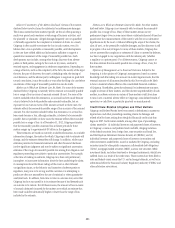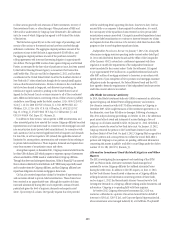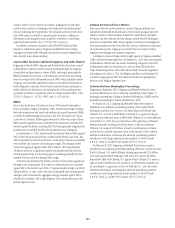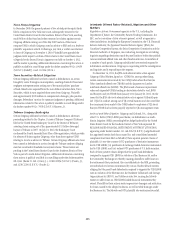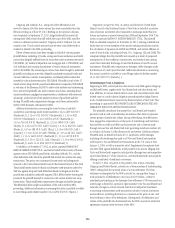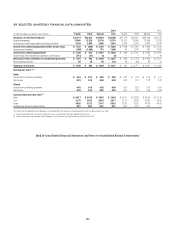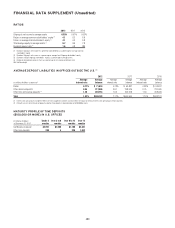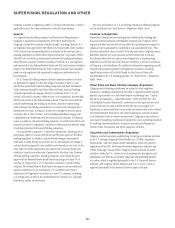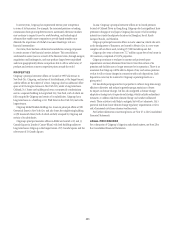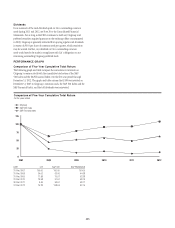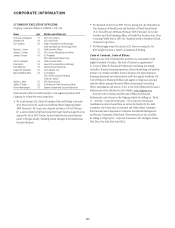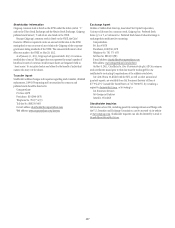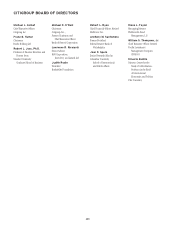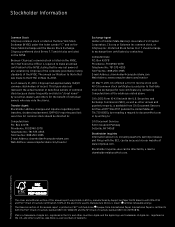Citibank 2012 Annual Report Download - page 313
Download and view the complete annual report
Please find page 313 of the 2012 Citibank annual report below. You can navigate through the pages in the report by either clicking on the pages listed below, or by using the keyword search tool below to find specific information within the annual report.291
Citigroup also has subsidiaries that are members of futures exchanges
and are registered accordingly. In the U.S., CGMI is a member of the
principal U.S. futures exchanges, and Citigroup has subsidiaries that are
registered as futures commission merchants and commodity pool operators
with the Commodity Futures Trading Commission (CTFC). On December
31, 2012, Citibank, N.A., CGMI, and Citigroup Energy Inc., registered as
swap dealers with the CFTC. CGMI is also subject to Rule 15c3-1 of the SEC
and Rule 1.17 of the CTFC, which specify uniform minimum net capital
requirements. Compliance with these rules could limit those operations of
CGMI that require the intensive use of capital, such as underwriting and
trading activities and the financing of customer account balances, and also
limits the ability of broker-dealers to transfer large amounts of capital to
parent companies and other affiliates. See also “Capital Resources—Broker-
Dealer Subsidiaries” and Note 20 to the Consolidated Financial Statements
for a further discussion of capital considerations of Citigroup’s non-
banking subsidiaries.
Dividends
Citigroup is currently subject to restrictions on its ability to pay common
stock dividends. See “Risk Factors—Market and Economic Risks” above. For
information on the ability of Citigroup’s subsidiary depository institutions
and non-bank subsidiaries to pay dividends, see “Capital Resources—Capital
Resources of Citigroup’s Subsidiary U.S. Depository Institutions” and Note 20
to the Consolidated Financial Statements above.
Transactions with Affiliates
The types and amounts of transactions between Citigroup’s U.S. subsidiary
depository institutions and their non-bank affiliates are regulated by
the Federal Reserve Board, and are generally required to be on arm’s-
length terms. See also “Capital Resources and Liquidity—Funding and
Liquidity” above.
Insolvency of an Insured U.S. Subsidiary Depository
Institution
If the FDIC is appointed the conservator or receiver of an FDIC-insured U.S.
subsidiary depository institution such as Citibank, N.A., upon its insolvency or
certain other events, the FDIC has the ability to transfer any of the depository
institution’s assets and liabilities to a new obligor without the approval of
the depository institution’s creditors, enforce the terms of the depository
institution’s contracts pursuant to their terms or repudiate or disaffirm
contracts or leases to which the depository institution is a party.
Additionally, the claims of holders of deposit liabilities and certain
claims for administrative expenses against an insured depository institution
would be afforded priority over other general unsecured claims against
such an institution, including claims of debt holders of the institution
and, under current interpretation, depositors in non-U.S. offices, in the
liquidation or other resolution of such an institution by any receiver. As a
result, such persons would be treated differently from and could receive,
if anything, substantially less than the depositors in U.S. offices of the
depository institution.
An FDIC-insured financial institution that is affiliated with a failed FDIC-
insured institution may have to indemnify the FDIC for losses resulting from
the insolvency of the failed institution. Such an FDIC indemnity claim is
generally superior in right of payment to claims of the holding company and
its affiliates and depositors against such depository institution.
Privacy and Data Security
Citigroup is subject to many U.S., state and international laws and
regulations relating to policies and procedures designed to protect the non-
public information of its consumers. Citigroup must periodically disclose
its privacy policy to consumers and must permit consumers to opt out of
Citigroup’s ability to use such information to market to affiliates and third-
party non-affiliates under certain circumstances. See also “Risk Factors—
Business and Operational Risks” above.
DISCLOSURE PURSUANT TO SECTION 219 OF THE
IRAN THREAT REDUCTION AND SYRIA HUMAN
RIGHTS ACT
Citi, through its wholly owned banking subsidiary, Citibank, N.A., has
branch operations in the United Arab Emirates (Citibank UAE), Bahrain
(Citibank Bahrain), Lebanon (Citibank Lebanon) and Venezuela (Citibank
Venezuela). These branches participate in the local government-run
clearing and settlement exchange networks in each country for transactions
involving automated teller machines (ATM), point-of-sale (POS) debit
card transactions and/or the clearing and settlement of domestic checks. In
addition, as required by the local law and the applicable operating rules for
these exchange networks, all network participants, including these Citibank
branches, must process transactions in which funds are drawn from, or
deposited into, client accounts of other network participants.


